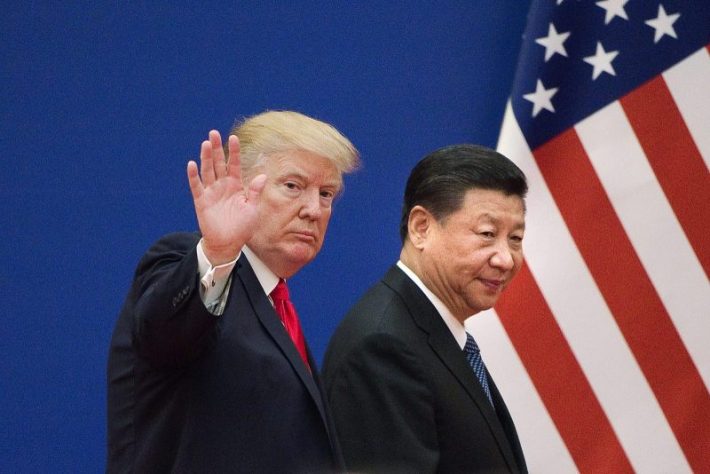US President Donald Trump spoke with Chinese leader Xi Jinping for over an hour on Thursday to cool intensifying trade tensions that had erupted over access to critical minerals.
In the rare leader-to-leader call, Xi told Trump to scale down trade controls that rocked the global economy, while also warning him against taking any threatening steps on Taiwan, according to a Chinese government summary.
Trump said on social media that the talks focused primarily on trade and had led to “a very positive conclusion.” He said there would be further lower-level US-China talks, and that “there should no longer be any questions respecting the complexity of Rare Earth products.”
ALSO SEE: China Sets up Tracking System to Trace Its Rare Earth Magnets
He later told reporters: “We’re in very good shape with China and the trade deal.”
The leaders also invited each other to visit their respective countries.
The highly anticipated call came in the middle of a dispute between Washington and Beijing in recent weeks over “rare earths” minerals that threatened to tear up a fragile truce in the trade war between the two biggest economies. It was not clear from either countries’ statements that the issue had been resolved.
Second trade meeting planned
A US delegation led by Treasury Secretary Scott Bessent, Commerce Secretary Howard Lutnick and Trade Representative Jamieson Greer will meet with their Chinese counterparts “shortly at a location to be determined,” Trump said on social media.
The countries struck a 90-day deal on May 12 to roll back some of the triple-digit, tit-for-tat tariffs they had placed on each other since Trump’s January inauguration.
Though stocks rallied, the temporary deal did not address broader concerns that strain the bilateral relationship, from the illicit fentanyl trade to the status of democratically governed Taiwan and US complaints about China’s state-dominated, export-driven economic model.
Since returning to the White House in January, Trump has repeatedly threatened an array of punitive measures on trading partners, only to revoke some of them at the last minute. The on-again, off-again approach has baffled world leaders and spooked business executives.
Major US stock indexes were higher on Thursday.
China’s decision in April to suspend exports of a wide range of critical minerals and magnets continues to disrupt supplies needed by automakers, computer chip manufacturers and military contractors around the world.
Washington and Beijing had both accused each other of alleged breaches of a trade truce they reached in Geneva last month.
In recent weeks a dispute over critical minerals has threatened to destroy the fragile truce in the trade war between the world’s two biggest economies.
Beijing sees mineral exports as a source of leverage – halting those exports could put domestic political pressure on the Republican US president if economic growth sags because companies cannot make mineral-powered products.
Beijing: ‘Take a realistic view’
The 90-day agreement to roll back tariffs and trade restrictions is tenuous. Trump has accused China of violating the deal and has ordered curbs on chip design software and other shipments to China. But Beijing rejected the claim and threatened counter-measures.
“The US side should take a realistic view of the progress made and withdraw the negative measures imposed on China,” the Chinese government said in a statement summarizing Xi’s call with Trump published by the state-run Xinhua news agency.
“Xi Jinping emphasized that the United States should handle the Taiwan issue prudently.”
In recent years, the United States has identified China as its top geopolitical rival and the only country in the world able to challenge the US economically and militarily.
Despite this and repeated tariff announcements, Trump has spoken admiringly of Xi, including of the Chinese leader’s toughness and ability to stay in power without the term limits imposed on US presidents.
Trump has long pushed for a call or a meeting with Xi, but China has rejected that as not in keeping with its traditional approach of working out agreement details before the leaders talk.
The US president and his aides see leader-to-leader talks as vital to sort through log-jams that have vexed lower-level officials in difficult negotiations.
Thursday’s call came at Trump’s request, China said.
It’s not clear when the two men last spoke.
Both sides said they spoke on January 17, days before Trump’s inauguration and Trump has repeatedly said that he had spoken to Xi since taking office on January 20. He has declined to say when any call took place or to give details of their conversation. China had said that the two leaders had not had any recent phone calls.
The talks are being closely watched by investors worried that a chaotic trade war could cut into corporate earnings and disrupt supply chains in the key months before the Christmas holiday shopping season. Trump’s tariffs are also the subject of ongoing litigation in US courts.
Trump has met Xi on several occasions, including exchange visits in 2017, but they have not met face to face since 2019 talks in Osaka, Japan.
Xi last traveled to the US in November 2023, for a summit with then-President Joe Biden, resulting in agreements to resume military-to-military communications and curb fentanyl production.
- Reuters with additional editing by Jim Pollard
NOTE: The text of this report was updated with details of the two leaders’ talks and the headline changed on June 6, 2025.
ALSO SEE:
Cloud on US-China Ties: Trump Says Xi ‘Hard to Make a Deal With’
Carmakers Stressed by China’s Curbs on Critical Mineral Exports
China Denies Trump Claim, Says It Was US That Broke Trade Deal
China ‘Totally Violated’ Tariffs Agreement With US, Trump Says
Trump’s Tariffs Reinstated as Appeals Court Pauses Trade Ruling
Shipments of US Ethane to China Face Export Licence Uncertainty
US Blocks Chip Design Software, Chemical Shipments to China
Beijing Says Latest US Chip Warning Puts Trade Truce at Risk
Mass Layoffs Avoided in China, But Export Sector Badly Shaken
Asian Markets Rise After US, China Agree to Cut Majority of Tariffs
China Follows US Playbook in Rare Earth Crackdown; Tesla Hit
China Halts Rare Earth Exports, Warns US on Deep-Sea Metals ‘Plan’
























